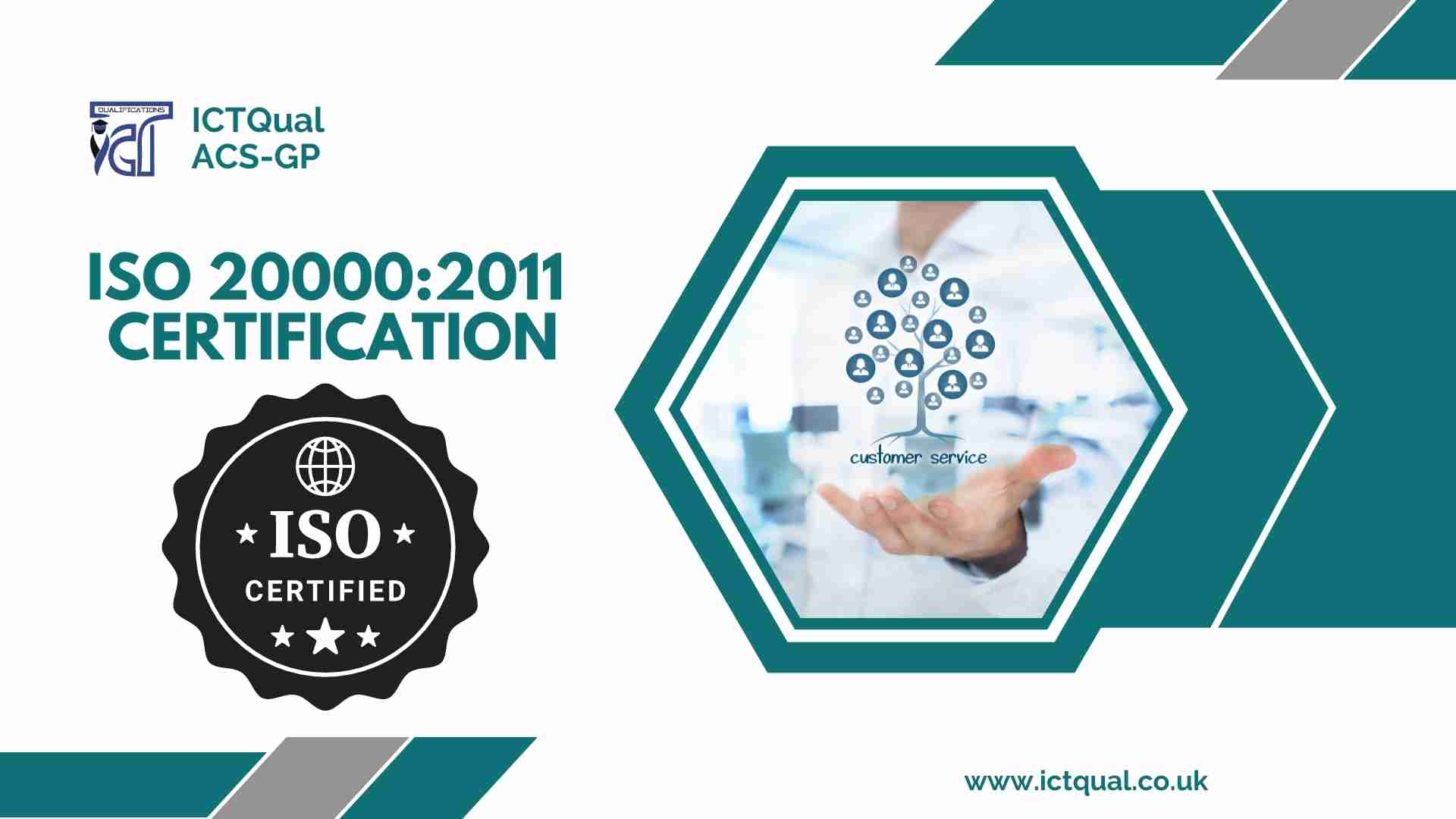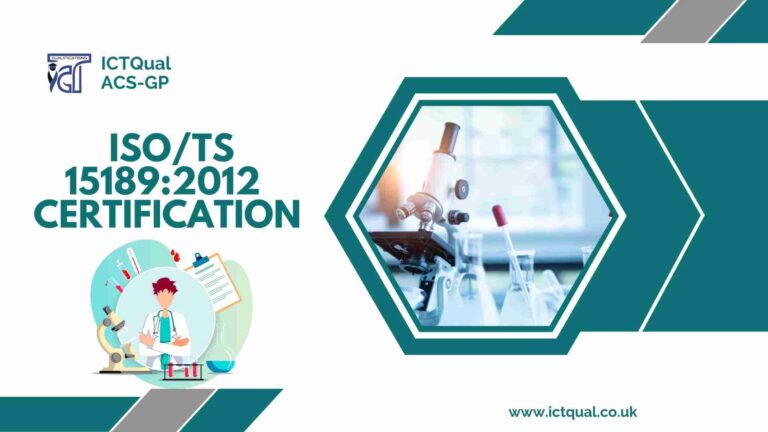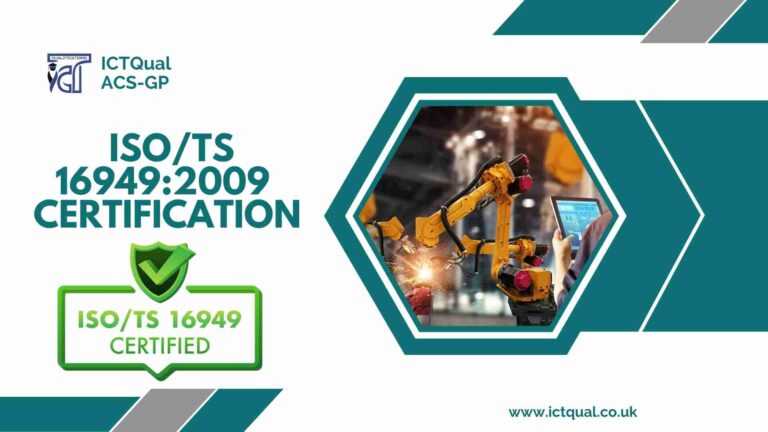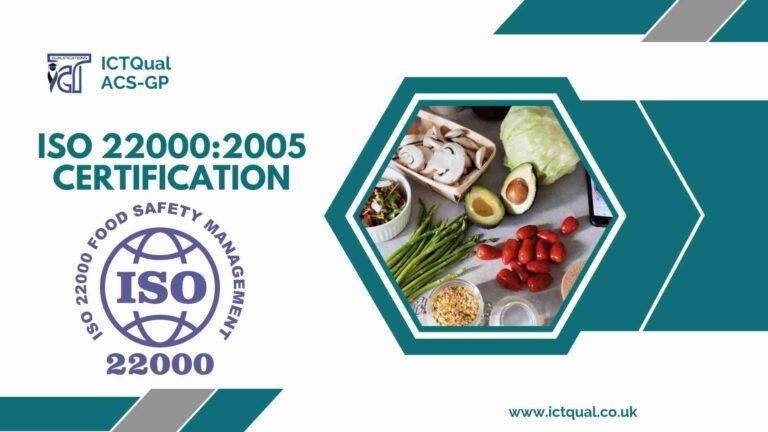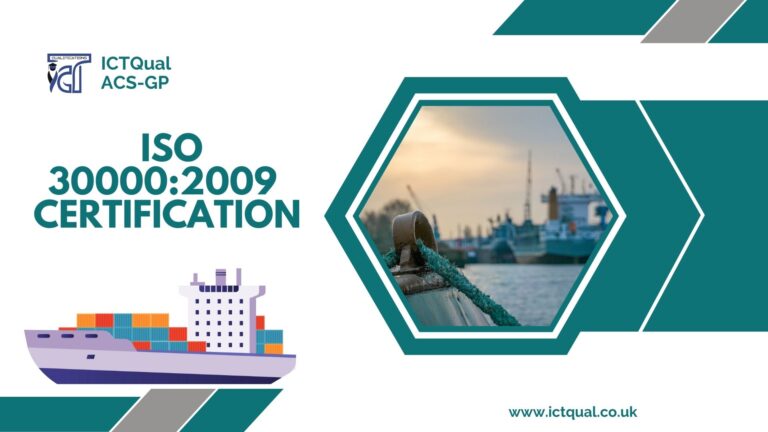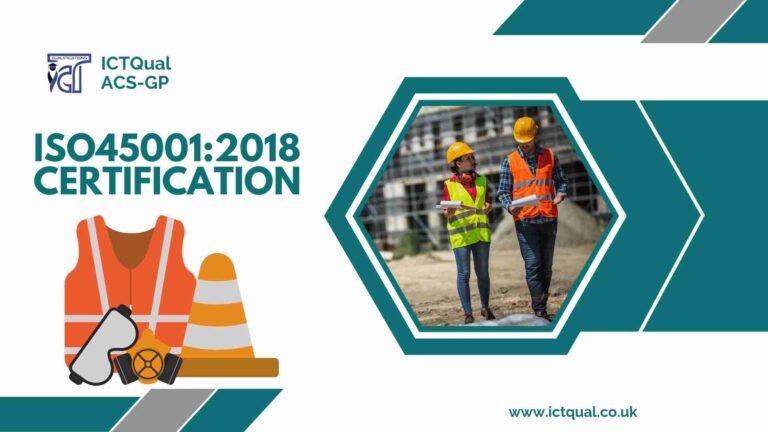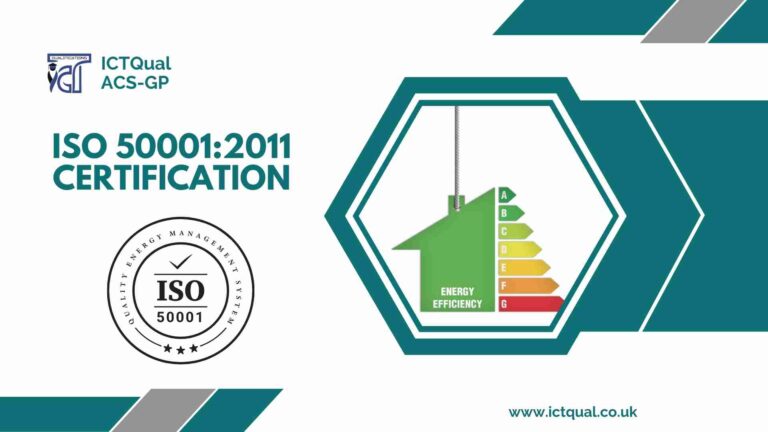Attention all business owners! Are you looking to improve the quality and consistency of your IT services while reducing costs and risks associated with service delivery? Look no further than ISO 20000:2011 certification! This international standard for IT Service Management outlines best practices for delivering high-quality IT services and can help your company demonstrate compliance with industry standards and improve customer satisfaction. Plus, achieving ISO 20000:2011 certification can enhance your company’s efficiency, productivity, and innovation. Don’t miss out on this opportunity to take your ITSM practices to the next level. Contact us today to learn more about the benefits of ISO 20000:2011 certification for your business!
ICTQual is Exclusive partner of ACS-GP and providing services for company registration with ISO in following ISO Standards
ISO 20000:2011 Certification and its Importance for Company
ISO 20000:2011 certification is an international standard that specifies the requirements for an organization to establish, implement, maintain, and continually improve its IT Service Management (ITSM) system. This certification demonstrates that a company’s ITSM practices conform to the industry best practices outlined in the standard.
The ISO 20000:2011 certification is important for companies for several reasons. Firstly, it provides a framework for companies to align their ITSM practices with the needs of their business and customers. By implementing the standard, companies can ensure that their IT services are delivered in a consistent and efficient manner, leading to increased customer satisfaction and loyalty.
Secondly, ISO 20000:2011 certification helps companies to reduce the risks associated with IT service delivery. The standard requires companies to identify and manage risks related to their ITSM practices, such as service availability and data security. This can help to prevent costly IT failures, downtime, and breaches, which can damage a company’s reputation and bottom line.
Thirdly, ISO 20000:2011 certification can help companies to improve their overall performance and efficiency. By implementing the standard’s requirements, companies can streamline their ITSM processes, reduce costs, and increase productivity. This can help to free up resources for other areas of the business and improve the company’s competitive position in the market.
Finally, ISO 20000:2011 certification is becoming increasingly important for companies that want to do business with government agencies and large enterprises. Many organizations now require their suppliers and partners to hold ISO 20000:2011 certification as a prerequisite for doing business. By obtaining the certification, companies can demonstrate their commitment to delivering high-quality IT services and gain a competitive advantage in the marketplace.
In conclusion, ISO 20000:2011 certification is a globally recognized standard that provides a framework for companies to establish and maintain effective ITSM practices. Achieving the certification can bring many benefits to companies, including improved customer satisfaction, reduced risks, increased efficiency, and improved competitive position.
Benefits of ISO 20000:2011 Certification for Company’s ITSM Practices
ISO 20000:2011 is an international standard for IT Service Management (ITSM) that outlines best practices for the delivery of high-quality IT services to customers. Achieving ISO 20000:2011 certification can bring numerous benefits to a company’s ITSM practices, including:
Improved Service Quality
ISO 20000:2011 certification requires a company to have well-defined and documented ITSM processes, which can lead to more consistent service quality. This can result in higher customer satisfaction and loyalty, as well as reduced service downtime and disruption.
Increased Efficiency
By following the best practices outlined in ISO 20000:2011, a company can improve its ITSM processes and make them more efficient. This can lead to faster service delivery, reduced costs, and increased productivity.
Better Risk Management
ISO 20000:2011 requires a company to have a robust risk management framework in place. By identifying and managing potential risks to IT services, a company can minimize the impact of service disruptions and ensure business continuity.
Enhanced Compliance
Compliance with industry best practices and regulatory requirements is increasingly important in today’s business environment. ISO 20000:2011 provides a framework for ITSM that is aligned with other industry standards such as ITIL and COBIT, as well as regulatory requirements such as GDPR.
Competitive Advantage
Achieving ISO 20000:2011 certification can be a significant differentiator for a company, particularly in industries where IT services play a critical role. Certification demonstrates to customers and stakeholders that a company has a commitment to quality and continuous improvement.
Improved Communication
ISO 20000:2011 certification requires a company to have clear and documented processes for communication and collaboration between IT and other departments. This can improve cross-functional cooperation and communication, leading to better outcomes for the business as a whole.
In summary, achieving ISO 20000:2011 certification can bring numerous benefits to a company’s ITSM practices, including improved service quality, increased efficiency, better risk management, enhanced compliance, competitive advantage, and improved communication. These benefits can help a company to provide better IT services, reduce costs, and improve overall business performance.
Prepare Your Company for ISO 20000:2011 Certification
If your company is considering pursuing ISO 20000:2011 certification, it’s important to have a solid plan in place to prepare for the certification process. Here are some steps you can take to prepare your company for ISO 20000:2011 certification:
Assess Your Current ITSM Practices
Before pursuing ISO 20000:2011 certification, it’s important to assess your company’s current ITSM practices to identify areas for improvement. This may involve conducting a gap analysis to compare your current practices against the requirements outlined in the standard.
Establish a Project Team
Establish a project team with representatives from across your company who will be responsible for overseeing the ISO 20000:2011 certification process. This team should include individuals with expertise in ITSM, quality management, and project management.
Define Your Scope
Define the scope of your ISO 20000:2011 certification, including which IT services and processes will be included in the certification. This will help ensure that your certification is relevant to your business needs and goals.
Develop a Plan of Action
Develop a plan of action that outlines the steps you need to take to prepare for ISO 20000:2011 certification. This plan should include timelines, milestones, and responsibilities for each member of the project team.
Implement and Document Your ITSM Processes
Implement and document your ITSM processes in accordance with the requirements of ISO 20000:2011. This may involve updating your policies, procedures, and work instructions, as well as developing new processes to fill any gaps identified during the gap analysis.
Conduct Internal Audits
Conduct internal audits to ensure that your ITSM processes are functioning as intended and are compliant with ISO 20000:2011. This will help identify any areas that need improvement before the certification audit.
Choose an Accredited Certification Body
Choose an accredited certification body to conduct your ISO 20000:2011 certification audit. Make sure to choose a certification body that has experience auditing organizations similar to yours and that is recognized by your industry.
Prepare for the Certification Audit
Prepare for the certification audit by reviewing your ITSM processes, documentation, and evidence of compliance. This will help ensure that you are fully prepared to demonstrate compliance with the requirements of ISO 20000:2011.
By following these steps, you can prepare your company for ISO 20000:2011 certification and demonstrate your commitment to providing high-quality IT services to your customers.
Is ISO 20000:2011 Certification Right for Your Company?
ISO 20000:2011 certification is a valuable accreditation for companies that want to demonstrate their commitment to providing high-quality IT services. However, it may not be the right choice for every organization. Here are some factors to consider when deciding whether ISO 20000:2011 certification is right for your company:
Business goals and objectives
ISO 20000:2011 certification can help companies to improve the quality and consistency of their IT services. However, it is important to assess whether this aligns with the company’s broader business goals and objectives. If IT service management is a key priority, then pursuing ISO 20000:2011 certification may be a good fit.
Organizational structure and size
ISO 20000:2011 certification is applicable to all types of organizations, regardless of size or industry. However, the certification process can be time-consuming and resource-intensive. Smaller companies may find it more challenging to allocate the necessary resources to pursue certification.
IT service maturity
ISO 20000:2011 certification is designed to help companies improve their IT service management practices. However, companies with less mature IT service management practices may struggle to meet the standard’s requirements. It is important to assess the current state of the company’s IT service management practices before pursuing certification.
Regulatory requirements
Depending on the industry and geographical location, some companies may be required to obtain ISO 20000:2011 certification to meet regulatory requirements. For example, government agencies or healthcare organizations may require certification to comply with data security and privacy regulations.
Customer requirements
ISO 20000:2011 certification can be a valuable differentiator in the marketplace. If customers prioritize high-quality IT services, then pursuing certification may be a way to demonstrate the company’s commitment to meeting those expectations.
In conclusion, ISO 20000:2011 certification is a valuable accreditation for companies that prioritize high-quality IT services. However, it is important to consider whether certification aligns with the company’s broader business goals and objectives, as well as the company’s organizational structure, IT service maturity, regulatory requirements, and customer requirements.
Key Requirements for ISO 20000:2011 Certification
ISO 20000:2011 certification is an internationally recognized standard for IT Service Management (ITSM) that helps companies ensure their IT services are delivered with high quality and efficiency. If you’re considering pursuing ISO 20000:2011 certification for your company, it’s important to understand the key requirements involved in achieving and maintaining it. Here are some of the essential requirements that companies must meet to obtain ISO 20000:2011 certification:
Documentation of ITSM processes
Companies seeking ISO 20000:2011 certification must document their ITSM processes in a clear and comprehensive manner. This includes procedures for incident management, problem management, change management, and other key ITSM processes.
Establishment of a service management system
Companies must establish a service management system (SMS) that enables them to plan, implement, operate, monitor, review, maintain, and improve their ITSM processes. The SMS should be tailored to the company’s specific needs and objectives.
Management commitment
Top management must be committed to achieving and maintaining ISO 20000:2011 certification. This involves providing the necessary resources, establishing an ITSM policy, and demonstrating leadership in promoting a culture of continuous improvement.
Continuous improvement
Companies must continuously improve their ITSM processes by monitoring and measuring their performance, analyzing data, and taking action to address any issues or areas for improvement.
Internal audits
Companies must conduct regular internal audits of their ITSM processes to ensure compliance with ISO 20000:2011 requirements and identify opportunities for improvement.
Management review
Top management must review the effectiveness of the SMS and ITSM processes at regular intervals to ensure they remain relevant and effective.
External audit
Companies must undergo an external audit by an accredited certification body to verify that their ITSM processes meet ISO 20000:2011 requirements.
Meeting these requirements can be challenging, but the benefits of ISO 20000:2011 certification for companies are significant, including improved IT service quality, customer satisfaction, and operational efficiency. If you’re considering pursuing ISO 20000:2011 certification, working with an experienced consultant or certification body can help ensure your company meets all the necessary requirements and achieves successful certification.
ISO 20000:2011 Certification Process
The ISO 20000:2011 certification process is designed to help companies demonstrate that their IT Service Management (ITSM) practices meet the requirements of the international standard for ITSM. The certification process involves a rigorous assessment of a company’s ITSM processes, documentation, and controls by an accredited certification body.
Here are the main steps involved in the ISO 20000:2011 certification process:
Preparation
Before starting the certification process, a company should conduct an internal assessment of its ITSM practices to identify any gaps or areas for improvement. It should also select an accredited certification body to conduct the audit.
Gap Analysis
The certification body will conduct a gap analysis to identify any areas where the company’s ITSM practices do not meet the requirements of the ISO 20000:2011 standard. The gap analysis will provide the company with a list of findings and recommendations for improvement.
Implementation
The company will need to implement the recommended improvements and update its ITSM processes and documentation to meet the ISO 20000:2011 standard. The certification body will then conduct an audit of the updated processes and documentation.
Stage 1 Audit
The certification body will conduct an initial audit (Stage 1) to assess the company’s ITSM documentation and verify that it meets the ISO 20000:2011 standard.
Stage 2 Audit
The certification body will conduct a more in-depth audit (Stage 2) to assess the company’s ITSM processes and controls. This will include interviews with staff, observation of processes in action, and review of records and documentation.
Certification
If the company’s ITSM practices meet the requirements of the ISO 20000:2011 standard, the certification body will issue an ISO 20000:2011 certificate. The certificate is valid for three years, and the company will need to undergo regular surveillance audits to maintain the certification.
The ISO 20000:2011 certification process can be challenging, but it can also provide significant benefits for companies that achieve certification. It can help to improve the quality and consistency of IT services, increase customer satisfaction and loyalty, and reduce costs and risks associated with IT service delivery.
Final Words About ISO 20000:2011 Certification
ISO 20000:2011 certification is a valuable achievement for companies seeking to improve their IT service management practices. By following the guidelines outlined in the standard, companies can enhance the quality and consistency of their IT services, reduce costs and risks associated with service delivery, and demonstrate compliance with industry best practices.
However, achieving ISO 20000:2011 certification is not a one-time event. Companies must maintain their certification by continuously improving their ITSM practices and adapting to changes in technology and customer needs.
Overall, ISO 20000:2011 certification can help companies to establish a culture of continuous improvement and innovation in IT service management, which can lead to greater efficiency, productivity, and customer satisfaction. If your company is considering pursuing ISO 20000:2011 certification, it is important to carefully evaluate the benefits and challenges involved and to develop a comprehensive strategy for achieving and maintaining certification.

